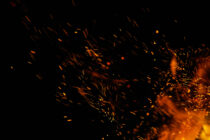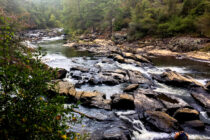We are quickly approaching the Christian season of Lent—a season symbolized by the wilderness and Jesus in the desert. It’s a season of dryness, of surrender, of temptation. It’s a time during which we prepare for the ultimate resurrection we will find on Easter morning. We engage in this preparation under the acknowledgment that resurrection cannot happen without a journey to the cross and a call to submit to our own crucifixion. The Lenten journey into the wilderness submission to the cross transforms us as the community of believers.
Walter Brueggemann beautifully talks about Lent this way: “I imagine Lent for you and for me as a great departure from the greedy, anxious antineighborliness of our economy, a great departure from our exclusionary politics that fears the other, a great departure from self-indulgent consumerism that devours creation. And then an arrival in a new neighborhood, because it is a gift to be simple, it is a gift to be free; it is a gift to come down where we ought to be.”
Over the course of our lives, we find ourselves accumulating baggage, whether anger toward people, fear over situations, or hurt from relational dysfunction. In our attempts to avoid pain, we may self-medicate through substances, avoidance, or relationships. Lent is the gift of returning and releasing. Lent is an invitation to leave the lies, to walk away from the failures of our past, to take a look at our hurts, and to once again begin to rely on God as the source of all strength and sustenance. To do this takes intentionality, though. It takes space and time. The wilderness journey of Lent provides us with that intentional space and time, which may leave us wondering how we can make the most of it. I offer here a few simple suggestions.
1. Allow the biblical poets to be our spiritual translators. The biblical poets help us understand ourselves. Be it Psalms, Proverbs, or Lamentations, the poetry in Scripture gives language to what’s happening inside us. Lent can stir up strong emotions or spiritual experiences we may or may not know how to name. The poets can help us here. In their honesty—whether anger, lament, resentment, hope, or joy—they give structure and form to what’s happening in the heart. As we read through these joyful songs or grief-filled laments, we will find their holy words bubbling up in our prayers and appearing in our hearts at just the right moment. They will become holy interruptions as we address what Lent brings to the surface. Poetry is the language of the heart; may we learn to speak it.
2. Pray. Primary in all things, but especially in the wilderness, is the understanding that the God of the universe desires to reveal a whole and perfect love to God’s children. While there are many ways to receive this love, one primary avenue is through prayer and silence. Through sitting in holy silence, we become aware that God is near to us. Through prayer, we connect to and hear from the Holy Spirit. Through prayer, we’re healed. But we must first show up. In a chaotic world, that’s no easy task. However, even as the wilderness calls us away through the temptation of consumption and empty promises, the Holy Spirit beckons us into a deeper mystery through silence and prayer.
For those looking for help as they begin to pray:
– If you find podcasts helpful, consider listening to: The Examen, by Fr. James Martin, or Daily Disconnect, by the Order of Carmelites.
– You can also enter into the tradition of prayer that reaches back centuries. Consider praying the hours, which is another way of dedicating ourselves to stopping and praying at set points throughout the day. A free online breviary can be found here.
– Maybe freeform prayer comes easily and naturally to you. If so, by all means pray!
No matter how we pray, may we all remember to spend as much time (or more) listening as we do speaking.
3. Read a spiritually formative book. There are many who have gone before us on the Lenten spiritual journey—women and men who offer wisdom and insight into the spiritual life. One of the difficult parts of this wilderness journey is that it can be disorienting. What do we do with doubt? How do we find our way out of fear? What do we do if God seems silent? How do we know we’re hearing the Spirit correctly? Spiritual wisdom gained through experience was meant to be passed on. The lessons we learn in the spiritual journey do not exist solely for our own benefit. The Holy Spirit intends for us to share what we learn in order to help others. In the wisdom accrued through the long history of our faith, we find a rich and deep well. Reading the words of those who have gone before us will give us guideposts to know we’re heading the right way. They offer us a measure of guidance and help us navigate through often unfamiliar terrain. Certainly there are numerous resources out there, and I could list many, but I’ll recommend just one, from The Foundry Publishing: For God So Loved, written by church leaders and veterans in the faith Dan Boone, Samantha Chambo, Tara Beth Leach, and Jeren Rowell.
4. Surrender. Part of the Lenten journey is the act of sacrifice. We enter into the season asking ourselves: What is vying for our allegiance? Where do we search for meaning outside of Christ? Where are we using too much time? Is there an unhealthy habit or practice we would be wise to deal with? As we begin to think about giving something up, it’s easy to believe that either we must be 100% successful or we’ll be a complete and utter failure. Either we fast until Easter, or it was all a waste of effort. This mentality is neither healthy nor accurate. The true purpose of the wilderness is not legalistic adherence to any self-imposed rule. We do not gain greater spiritual depth because we successfully did or did not do something. Rather, victory is found in learning to notice and address false idols that have taken residence in our hearts. As you make decisions about what you will fast, remember that it’s not about winning. It’s not about making it to Easter without eating sugar. The next forty days are about formation. They are about arriving at an empty tomb and realizing the journey has revealed how firmly we remain in the loving security of God and how powerfully the Holy Spirit works on our behalf when we submit to the Spirit’s work within us.
This Lent, may we find a fresh richness in this wilderness period. May we trust wholly in the faithfulness of God, and may we have the courage to cast down anything that might keep us from the healing and wholeness offered by Christ. May the wilderness bring us home.








1 Comments
Ron Bynum
Thank you for these thoughts and insights, Michael. I’ll be honest, I’ve not given much of an emphasis on Lent in my church. But I’ve decided that this year is going to be different, both in my own life and hopefully in the life of my congregation. So again, thank you!